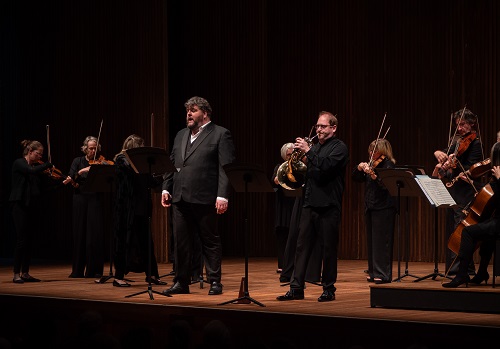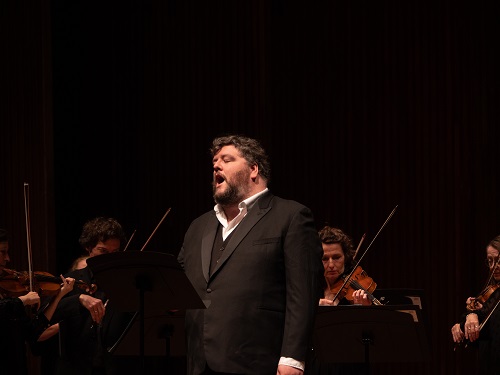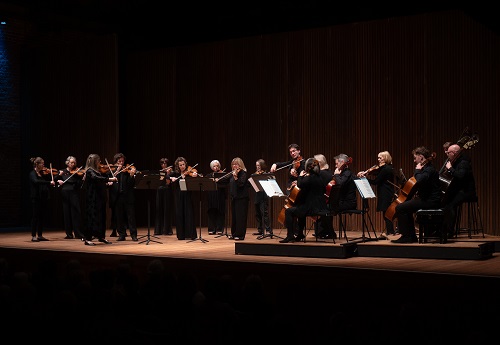On 15 October 1943, Britten’s for tenor, horn and strings received its premiere at Wigmore Hall, performed by Peter Pears, Dennis Brain and a string ensemble conducted by Walter Goehr. William Glock, the Observer critic, was among many who were impressed: ‘in Benjamin Britten we have at last a composer who offers us visions as great as [Brahms maturest works]. His new Serenade … surpasses everything else of his in strength and feeling.’ 80 years to the day of that first performance, the Britten Sinfonia concluded the 2023 Britten Weekend at Snape Maltings with a celebration of a selection of Britten’s music from the early 1940s, and were joined in the Serenade by horn-player Martin Owen and tenor Stuart Jackson.
The Serenade owed its instrumentation to a broadcast in 1942 of the RAF Orchestra performing Britten’s incidental music to a radio series, An American in England. Impressed with the talents of the orchestra’s principal horn player, Britten approached the 22-year-old Brain and sought to learn more about the instrument. The resulting Serenade fully exploits the technical and expressive potential of the horn, not least in the short Prologue in which the unaccompanied horn plays entirely on its natural harmonics, with the arising ‘out of tune’ quality of some of these harmonics perfectly capturing the strangeness of the shadowy darkness into which the ensuing poems will lead us – hinting at half-worlds and half-memories, some calm, some menacing.

Martin Owen eschewed the natural horn, and his valved instrument glowed a little too brightly and truly for my liking in the Prologue. There was no doubting the assuredness of the manner or the loveliness of the tone, but what should be veiled and haunting seemed infused with golden warmth, when the poem which follows, Charles Cotton’s ‘Pastoral’, tells us that the day has “grown old; the fainting Sun/ Has but a little way to run”. Stuart Jackson, replacing at short notice the indisposed Allan Clayton, captured the gentle elegy of Cotton’s poetry, as shadows extend and “Phoebus, dipping in the West, / Shall lead the world the way to rest”, drawing us hypnotically into the night, sleep and the subconscious. But, if the clarity and lightness of the textures that the string players of the Britten Sinfonia etched was a perfect complement to the waning of the day, evoking the cooling of the evening air, then the horn’s dynamic diatonicism seemed too vitalised and often overwhelmed the mildness of the calm, floating vocal line.
Such vigour found its place in the ‘Nocturne’, though, where the horn’s energy sent the bugle’s echoes flying and was matched by the incisiveness of the thrusting, jagged strings. Here, Jackson brightened his tenor and communicated the splendour and glory of the scene painted by Tennyson, as well as the mournfulness of those muted fades. In ‘Elegy’, Blake’s bitterness was conjured by the almost suffocating swells in the strings, and if amid the darkness tenor and solo strings found some light, then it was extinguished by the horn’s ‘bending’ of the fading calls as secret love is destroyed. Jackson built the dramatic intensity through Britten’s setting of the anonymous, fifteenth-century ‘Lyke Wake Dirge’, though more textual definition would be required to communicate the anger that seethes through heightened repetitions of phrases such as “This ae night” and “Every nighte and alle”.

The horn’s earthy freedom envigored the ‘Hymn to Diana’ and Jackson sang with buoyant joy and adulation. Both performers assailed the athletic demands with seemingly effortless agility. Eloquently and tenderly summoning sleep, Jackson put both cares and celebrations to rest in ‘Sonnet’, Britten’s moving setting of Keats’ ‘O soft embalmer of the still midnight’, caressing the vocal line with soft, soporific smoothness. One imagines Jackson’s Peter Grimes would be a visionary dreamer rather than the brutal fisherman of Jon Vickers’ fashioning! From the wings of the Maltings, Owen’s Epilogue cast its baleful nocturnal shadow.
Early in the programme, Jackson sang other works by Britten dating from the early 1940s: two of the composer’s arrangements of traditional folksongs. A relaxed tempo was adopted for ‘O Waly, Waly’, and Jackson’s approach was one of non-interference, just letting the beautiful melody unfold, with a little expressive enrichening as the poet-speaker’s imagery conveys the all-consuming nature of his love: “A ship there is, and she sails the sea,/ She’s loaded deep as deep can be,/ But not so deep as the love I’m in: I know not if I sink or swim.” The pulsing of the lower strings provided lift and movement, just as pizzicato precision and placement propelled the restful ‘The Salley Gardens’.

The Britten Sinfonia wove instrumental items around the vocal works. Frank Bridge’s Sir Roger de Coverley: A Christmas Dance showcased the dazzling brilliance of the string players’ rhythmic panache and ensemble slickness, as well as reminding us what a talented orchestrator Bridge was. Gustav Holst’s St Paul’s Suite danced and sang with gleefulness too, the ‘Jig’ enervated by taut cross-rhythms, the ‘Ostinato’ a whisper, slipping deliciously through the air, the final ‘Dargason’ a rich feast of melodic exchanges. The ‘Intermezzo’ balanced elegy and abandon, shifting persuasively between the two. After the interval we heard Elgar’s ever-popular Serenade for strings, which the Britten Sinfonia made new and fresh. They took the Allegro piacevole at a brisk lick, maintaining an uplifting airiness, and avoided over-indulgence in the Larghetto, letting the natural warmth of their ensemble tone do the expressive work, perfectly attuned to each other’s phrasal nuances. I loved the nonchalance of the closing Allegretto, though the shades and shadows were not neglected, and the last three chords were exquisitely placed.
There was, for me, a new discovery, too – right at the start of the concert, in the form of Britten’s Prelude and Fugue for 18 strings, which was composed in the same year as the Serenade and which I’m sure I’ve never heard before. Searing up-bow unisons, simmering G-string climbs and resonant bass pizzicatos exploded in the Fugue into an excited complexity of musical arguments, all lucidly articulated with an ever-changing palette of colours. It was a wonderful start to what proved to be a super Sunday-afternoon concert.
Claire Seymour
Stuart Jackson (tenor), Michael Owen (horn), Britten Sinfonia (Clio Could, leader)
Britten – Prelude & Fugue for 18 strings Op.23, Trad. (arr. Britten) ‘O Waly, waly’, Bridge – Sir Roger de Coverley: A Christmas Dance, Trad. (arr. Britten) ‘The Salley Gardens’, Holst – St Paul’s Suite, Elgar – Serenade for strings Op.20, Britten – Serenade Op.31
Snape Maltings Concert Hall, Snape, Suffolk; Sunday 15th October 2023.